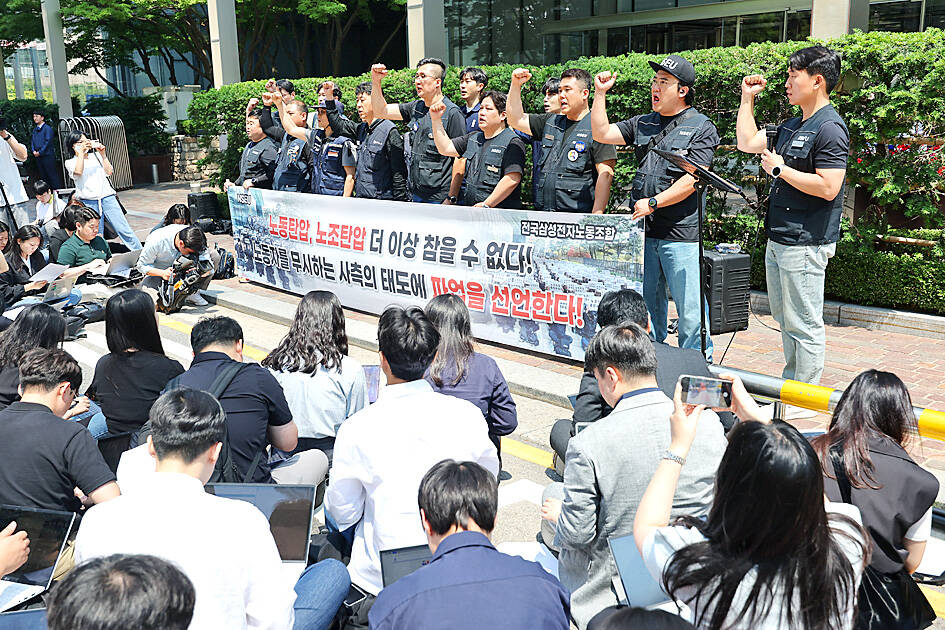Samsung Electronics Co’s labor union yesterday said it plans to carry out its first-ever strike, adding to the challenges for South Korea’s largest company as it seeks to recover from setbacks in its semiconductor business.
The National Samsung Electronics Union, the largest of the tech giant’s several unions with about 28,000 workers, announced the decision after wage negotiations with management stalled. The two sides have been in discussions since the start of this year, but have failed to resolve their differences.
“What we want is not a 1 to 2 percent wage increase. What we want is to be paid fairly for the amount of work done,” the union said in a statement in front of Samsung’s offices in Seoul. “We want to be compensated for our labor fairly and transparently.”

Photo: EPA-EFE
The union’s decision comes as Samsung, led by executive chairman Jay Y. Lee, finds itself in the unusual position of playing catch-up in a key sector of the chips industry. Local rival SK Hynix Inc has jumped out to an early lead in the memory chips that are used for the development of artificial intelligence services, a booming sector of the business.
“The company remains committed to engaging in good faith negotiations with the unions, and is making every sincere effort to an agreement,” Samsung said in a statement.
It is unclear how the union action would affect Samsung’s business. Some of the union workers plan to skip work on Friday next week. Union leaders say they have estimated the number of workers who would participate internally, but declined to specify the figure.
They have plans for a subsequent strike if management declines to engage in talks, but would not reveal the date.
The first strike day is a Friday, between a Thursday holiday and the weekend, so the absences would let workers take an extended break. Union leaders do not expect a significant impact on production lines for chips and other electronics as much of the operation is automated and Samsung has an extensive workforce.
The union wants top management, including Lee, to take their views more seriously. The heir of the company’s founding family pledged in 2020 to end its past practices of suppressing organized labor activities.
“Despite chairman Jay Y. Lee’s declaration that nonunion management will be eliminated, there is no change in the management’s attitude,” the union said. “We can no longer stand by the company’s lack of will to negotiate.”
Union head Son Woo-mok said that one of the key issues in negotiations is bonus payments.
In March, Samsung’s labor-management council decided to increase this year’s pay by 5.1 percent, as South Korea has been working to contain inflation in the past few months, like many other countries.
Unionized workers have drawn a public backlash after holding a concert-like rally with performances by celebrities in Seoul last week. Samsung Electronics has not had a strike since its founding in 1969.

BYPASSING CHINA TARIFFS: In the first five months of this year, Foxconn sent US$4.4bn of iPhones to the US from India, compared with US$3.7bn in the whole of last year Nearly all the iPhones exported by Foxconn Technology Group (富士康科技集團) from India went to the US between March and last month, customs data showed, far above last year’s average of 50 percent and a clear sign of Apple Inc’s efforts to bypass high US tariffs imposed on China. The numbers, being reported by Reuters for the first time, show that Apple has realigned its India exports to almost exclusively serve the US market, when previously the devices were more widely distributed to nations including the Netherlands and the Czech Republic. During March to last month, Foxconn, known as Hon Hai Precision Industry

Taiwan Semiconductor Manufacturing Co (TSMC, 台積電) and the University of Tokyo (UTokyo) yesterday announced the launch of the TSMC-UTokyo Lab to promote advanced semiconductor research, education and talent development. The lab is TSMC’s first laboratory collaboration with a university outside Taiwan, the company said in a statement. The lab would leverage “the extensive knowledge, experience, and creativity” of both institutions, the company said. It is located in the Asano Section of UTokyo’s Hongo, Tokyo, campus and would be managed by UTokyo faculty, guided by directors from UTokyo and TSMC, the company said. TSMC began working with UTokyo in 2019, resulting in 21 research projects,

Ashton Hall’s morning routine involves dunking his head in iced Saratoga Spring Water. For the company that sells the bottled water — Hall’s brand of choice for drinking, brushing his teeth and submerging himself — that is fantastic news. “We’re so thankful to this incredible fitness influencer called Ashton Hall,” Saratoga owner Primo Brands Corp’s CEO Robbert Rietbroek said on an earnings call after Hall’s morning routine video went viral. “He really helped put our brand on the map.” Primo Brands, which was not affiliated with Hall when he made his video, is among the increasing number of companies benefiting from influencer

Quanta Computer Inc (廣達) chairman Barry Lam (林百里) yesterday expressed a downbeat view about the prospects of humanoid robots, given high manufacturing costs and a lack of target customers. Despite rising demand and high expectations for humanoid robots, high research-and-development costs and uncertain profitability remain major concerns, Lam told reporters following the company’s annual shareholders’ meeting in Taoyuan. “Since it seems a bit unworthy to use such high-cost robots to do household chores, I believe robots designed for specific purposes would be more valuable and present a better business opportunity,” Lam said Instead of investing in humanoid robots, Quanta has opted to invest